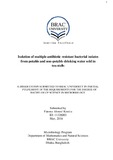| dc.contributor.advisor | Hossain, Dr.Mahboob | |
| dc.contributor.advisor | Islam, Namista | |
| dc.contributor.author | Konica, Fatema Ahmed | |
| dc.date.accessioned | 2017-05-07T09:05:18Z | |
| dc.date.available | 2017-05-07T09:05:18Z | |
| dc.date.copyright | 2016 | |
| dc.date.issued | 2016-05 | |
| dc.identifier.other | ID 11326003 | |
| dc.identifier.uri | http://hdl.handle.net/10361/8099 | |
| dc.description | This thesis report is submitted in partial fulfillment of the requirement for the degree of B.Sc in Microbiology, 2016. | en_US |
| dc.description | Cataloged from PDF version of thesis report. | |
| dc.description | Includes bibliographical references (page 45-48). | |
| dc.description.abstract | Water, another name is life. It is impossible for all living body to survive without water. About 75% of the whole volume of earth is water among which only 1% is drinkable. Worldwide 1.2 billion people suffer from inadequate access to clean water. Day by day the life of human is becoming very busy. Gradually for livelihood people are becoming outbound. In context of Bangladesh, Dhaka is a very busy city. Most of the cases people do not carry enough drinking water with them. They feel comfortable to buy bottled mineral water or drink water from the nearby tea-stall. The purpose of this study was to check how much pure this type of drinking water which is normally found at tea-stall.
Multiple Antibiotic Resistant (MAR) strain is a threat for public health especially in developing countries like Bangladesh. For this reason in this research work MAR isolation from drinking water has been carried out. In this study, water samples for faecal indicators and their sensitivity label was evaluated. Heterotrophic Plate Count (HPC) and antibiotic sensitivity tests were done to identify the MAR strain. In this study seven isolates were found with MAR characteristics. For the isolation of various bacterial species five types of agar media were used i.e. TCBS for vibrio spp, XLD for Salmonella spp. and Shigella spp, MAC for coliform and enteric pathogen, NA for total viable count, m-FC for faecal coliform and cetrimide for Pseudomonas spp. In the present study Pragia fontium, Erwinia tracheiphila, Citrobacter rodentium, Yersinia aleksiciae, Tatumella punctata, Enteric Group68, Vibrio sinaloensis, Vibrio fluvialis, Tatumella citre, Tatumella punctata, Yersinia bercovieri, Yersinia mollaretii, Tatumell apunctata, Tatumell acitrea were observed in different drinking water samples. The findings are redoubtable since frequently suggested antibiotics revealed incompatible with intended pathogens and demand further extensive study with combined drug effect. | en_US |
| dc.description.statementofresponsibility | Fatema Ahmed Konica | |
| dc.format.extent | 57 pages | |
| dc.language.iso | en | en_US |
| dc.publisher | BRAC University | en_US |
| dc.rights | BRAC University thesis are protected by copyright. They may be viewed from this source for any purpose, but reproduction or distribution in any format is prohibited without written permission. | |
| dc.subject | Multiple antibiotic resistant | en_US |
| dc.subject | Potable drinking water | en_US |
| dc.subject | Non-potable drinking water | en_US |
| dc.title | Isolation of multiple antibiotic resistant bacterial isolates from potable and non-potable drinking water sold in tea-stalls | en_US |
| dc.type | Thesis | en_US |
| dc.contributor.department | Department of Mathematics and Natural Sciences, BRAC University | |
| dc.description.degree | B. Microbiology | |

